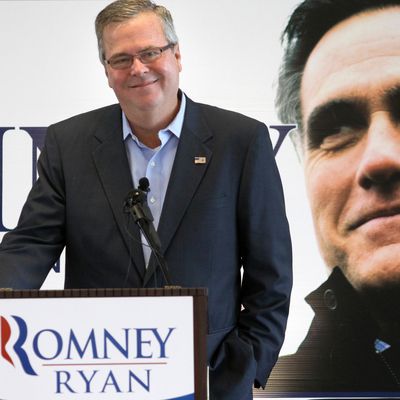
As many Republican presidential candidates vowed to defund Planned Parenthood this fall, even if it means shutting down the government, Hillary Clinton accused the GOP of launching a “full-on assault on women’s health.” On Tuesday, Jeb Bush underscored that point for her. When asked about his support for cutting federal funding to Planned Parenthood at the Southern Baptist Convention event in Nashville, Bush tried to explain why it isn’t a so-called “war on women.” “You could take dollar for dollar — although I’m not sure we need a half a billion dollars for women’s health issues — but if you took dollar for dollar, there are many extraordinarily fine organizations, community health organizations, that exist, federally-sponsored community health organizations, to provide quality care for women on a wide variety of health issues,” he said. “But abortion should not be funded by the government.”
Democrats pounced on Bush’s unnecessary aside almost immediately:
And a few hours later, Bush released a statement walking back his remarks:
With regards to women’s health funding broadly, I misspoke, as there are countless community health centers, rural clinics, and other women’s health organizations that need to be fully funded. They provide critical services to all, but particularly low-income women who don’t have the access they need.
I was referring to the hard-to-fathom $500 million in federal funding that goes to Planned Parenthood – an organization that was callously participating in the unthinkable practice of selling fetal organs. Democrats and Republicans agree we absolutely must defund them and redirect those funds to other women’s health organizations.
Bush’s speedy response actually shows some progress, since it took him days to come up with the correct answer after he suggested in May that he would have invaded Iraq in 2003 even “knowing what we know now.” But he hasn’t figured out how to avoid such gaffes altogether. In the past three months, Bush declared “immigrants are more fertile,” said Americans “need to work longer hours,” and discussed a Medicare “phase out.” Gaffes are a part of every campaign these days (see Clinton’s “don’t let anybody tell you that it’s corporations and businesses that create jobs,”), but the severity and regularity of Bush’s flubs have drawn comparisons to the last GOP presidential nominee. “A few more months of this and the G.O.P. will be wishing for a candidate with the political skills of Mitt Romney,” Dan Pfeiffer, President Obama’s former communications director, tweeted on Tuesday.
Romney had a knack for serving up lines that supported the Democrats’ attempt to paint him as an out-of-touch CEO robot, from “47 percent” to “I like being able to fire people” and “corporations are people, my friend.” Like Romney, Bush is the Establishment favorite and has tried to position himself as the adult in the room. They also have some of the same liabilities. Jeb Bush’s support for Common Core riles conservatives much like Romneycare, one of the former Massachusetts governor’s biggest achievements. Bush is one of the few candidates with a background in finance, but unlike Romney’s long and successful career at Bain Capital, upon leaving the Florida governor’s mansion Bush spent seven years advising Lehman Brothers and Barclays, and was present as the former collapsed in 2008. Even Romney saw some troubling similarities. Sources told Politico that Bush’s business dealings were part of what inspired Romney’s brief 2016 campaign. “You saw what they did to me with Bain,” he reportedly said. “What do you think they’ll do to [Bush] over Barclays?”
As MSNBC notes, Clinton is trying to use the same strategy that Obama used against Romney in 2012. Rather than letting the election be a referendum on her, Clinton has launched aggressive attacks on Republican candidates. Over the past few weeks she’s been quick to hurl one-liners at GOP candidates in speeches and on social media, and Jeb Bush is one of her most frequent targets. “Now, he’s got no problem giving billions of dollars away to the super wealthy and powerful corporations, but I guess women’s health just isn’t a priority for him,” Clinton said at an event in Denver on Tuesday. “The truth is, what Jeb said, the other candidates believe, too.”
Despite the Romney-esque flavor of Bush’s campaign, there are many aspects where the two candidates differ. In June, FiveThirtyEight highlighted one of the biggest differences: Bush was faring much worse than Romney and other eventual GOP nominees were at that point in the race:
Mitt Romney was considered a weak front-runner in 2012, and he had three times the number of endorsement points as Bush has. John McCain, who was struggling in the summer of 2007, had 15 percentage points more of the endorsement share than Bush does right now. Meanwhile, Bush’s brother, George W. Bush, already had nearly 30 times the number of endorsement points and nearly 50 percentage points more of the endorsement share at this point in the 2000 race.
Of course, just a few weeks later, Donald Trump will be center stage at the Fox News debate on Thursday, and Trump led the latest CBS News poll with the support of 24 percent of Republican primary voters, compared to Bush’s 13 percent. It’s all the more reason to avoid handing your opponents sound bites for their attack ads.






























